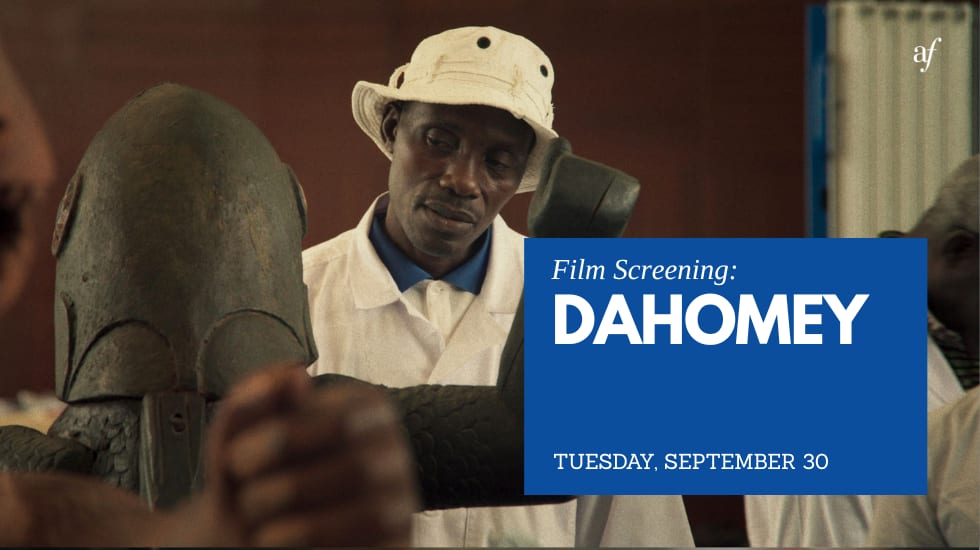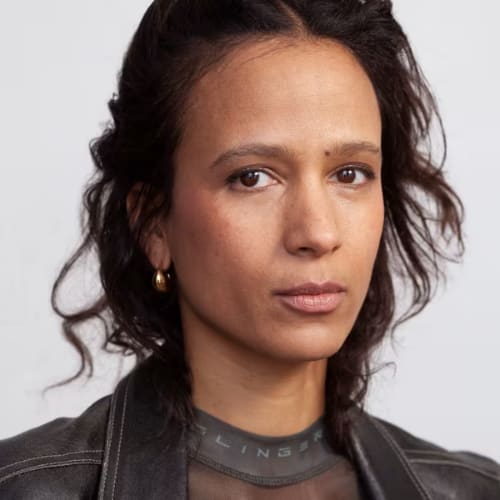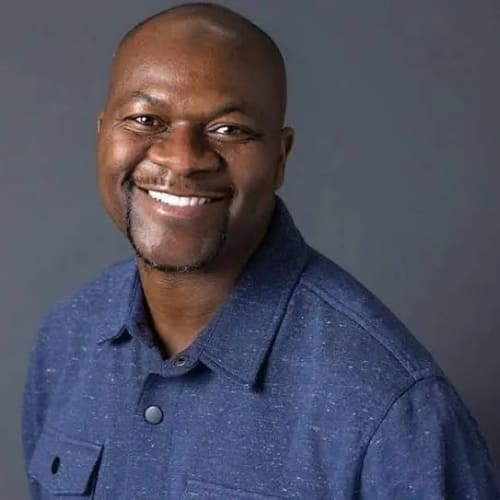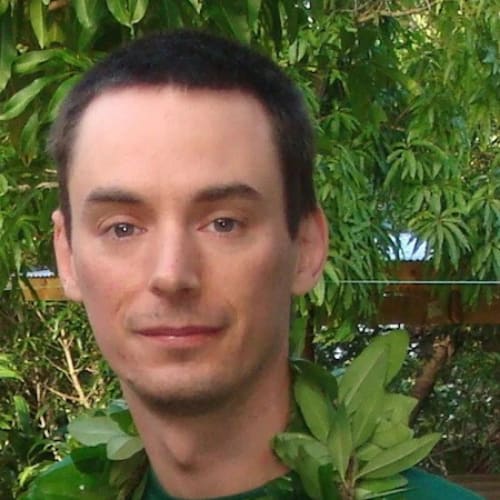
Film Screening & Panel Discussion: Dahomey by Mati Diop
Contemporary Approaches to Repatriation of Cultural Heritage
6:30 p.m. Tuesday, September 30
Julius Lewis Auditorium (54 W Chicago Ave)
In French with English Subtitles
Free for Members & Students (with .edu adress) · $15 for Non-Members
This event has passed
Cet évènement est passé
Description
November 2021. 26 royal treasures of the Kingdom of Dahomey are about to leave Paris to return to their country of origin, the present-day Republic of Benin. Along with thousands of others, these artefacts were plundered by French colonial troops in 1892. But what’s the attitude to adopt in response to these ancestors’ homecoming, in a country that had to forge ahead in their absence? The debate rages among students at the University of Abomey-Calavi.
Join us for a screening of French filmmaker Mati Diop’s 2024 documentary Dahomey, dramatised account of 26 royal treasures from the Kingdom of Dahomey (in modern-day Benin) that were returned from France to Benin, and the reactions of Beninese people.
Following the screening, we’ll host a conversation on contemporary approaches to repatriation of cultural heritage with Foreman Bandama, Field Museum Assistant Curator in African Anthropology, and Christopher Philipp, the Field’s African Ethnography Collection Manager.
The evening will conclude with a social reception featuring complimentary Beninese cuisine. Guests will also have the opportunity to purchase an autographed copy of Fifteen Colonial Thefts, the book our panelists contributed to.
Doors open at 6:00 p.m. Program starts at 6:30 p.m. Please enter via 54 W Chicago Ave. Non-alcoholic options will be available.
About the Film
Dahomey had its world premiere at the main competition of the 74th Berlin International Film Festival, where it won the festival’s top prize, the Golden Bear. It was released theatrically in France on September 11, 2024, by Les Films du Losange, to critical acclaim. It was named one of the Top 5 Documentary Films of 2024 by the National Board of Review.
Dahomey was also selected as the Senegalese entry for Best International Feature Film at the 97th Academy Awards,where it was shortlisted in two categories: Documentary Feature Film and International Feature Film.
French-Senegalese director Mati Diop fashions her superb, short but potent hybrid doc Dahomey as a slim lever that cracks open the sealed crate of colonial history, sending a hundred of its associated erasures and injustices tumbling into the light […] Dahomey is a striking, stirring example of the poetry that can result when the dead and the dispossessed speak to and through the living. - Jessica Kiang, Variety
About the Director
 Mati Diop
Mati Diop
Mati Diop is a French filmmaker and actress working in both France and Senegal. Her formally adventurous films explore exile and identity, memory and loss using fiction and documentary tools.
The films of Mati Diop conjure faraway places. Characters both fictional and quasi-documentary long for locales beyond their reach, or sometimes, as if in a trance, they drift magnetically toward them. No matter where the films take place, there is always the specter of somewhere else, and, perhaps with it, the possibility of a different life. These evocations of distant locations—a friend’s tropical Yucatan adventures relayed by text message in Snow Canon, memories of home mournfully recalled in Big in Vietnam, and the idea of an opportunity-rich Europe worth risking one’s life for in Atlantiques and A Thousand Suns (Mille soleils)—suffuse the concrete worlds her characters inhabit so that her films often seem to be in multiple places at once.
About the Panelists
 Foreman Bandama
Foreman Bandama
Foreman Bandama (PhD) is an archaeologist who specializes in the archaeology and technology of the African Iron Age materials relating to pre-industrial ceramics, glass beads and metallurgy, as well as African heritage. His research thrust is anchored by the need to re-position Africa at the center of global discourse by highlighting the continent’s achievements through materials studies that marry methods from the “hard” and “social” sciences. Foreman’s archaeometallurgical work straddles these disciplines but more significantly, his methods for analysing metals and their by-products, overlap with those used on other proxies that traditionally fall outside of this domain, such as glass beads and ceramic petrography. Dr. Bandama’s work also draws liberally from both African theory and his personal experiences a product of a rural crafting Tsonga family from Zimbabwe. Foreman is particularly interested in African innovations and achievements relating to complex societies and their interactions with the outside world, as well as a deep focus on decoloniality in heritage and archaeology. Among his long-term projects are exploring crafts, class and state formation at Great Zimbabwe, as well as African archaeometallurgical studies.
 Christopher Philipp
Christopher Philipp
Christopher Philipp is a collections manager in the Gantz Family Collections Center at the Field Museum, where he is responsible for the care of the museum’s anthropology collections from the Pacific islands. He is responsible for assisting with the care of and providing access to the Anthropology collections, including those originating from the continent of Africa (historic and contemporary culture), the Pacific Islands, and Latin America (Meso, Central, and South America).
About the Book
 Fifteen Colonial Thefts: A Guide to Looted African Heritage in Museums
Fifteen Colonial Thefts: A Guide to Looted African Heritage in Museums
Debates around restitution and decolonising museums continue to rage across the world. Artefacts, effigies and ancestral remains are finally being accurately contextualised and repatriated to their homelands.
Fifteen Colonial Thefts amplifies these discussions, exploring the history of colonial violence in Africa through the prism of fifteen African belongings – all looted at the height of the imperial era and brought to European museums.
Please be advised that students, members, and attendees at cultural events or programs may be photographed, and these images may be used for marketing purposes.
Share this page

